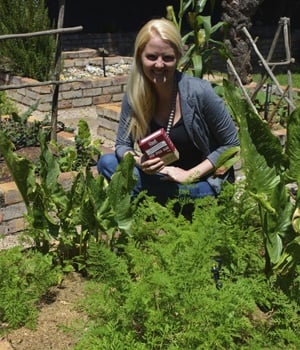
Claire Reid was just 16 when she invented paper strips containing vegetable seeds to help communities grow their own food. This year, Reel Gardening will launch internationally, she tells Sue Grant-Marshall
Staff at Reel Gardening pour out of the house in which they work in Blairgowrie, Joburg, to greet me. Enthusiastic, exuberant and young, they embody the community ethos of their CEO and founder, Claire Reid (30).
The humble house is the headquarters of the Reel Gardening network, which winds its way across South Africa, with representatives in nearly every province.
They tell communities, retailers and corporates about their biodegradable paper strips, or reels, which contain seeds, nutrients and organic fertiliser.
These strips can even be planted in the poorest-quality soil. Diagrams explain how to make a furrow and how deep to plant a strip.
Once planted, all that’s needed is sunlight and the right amount of water. The social entrepreneur explains that in our drought-stricken land, “the strips use 80% less water than sowing conventional seeds in gardens, because they absorb most of the water and indicate where watering is needed”.
This is no thumb-suck figure – after winning a gold medal at the 2002 Eskom Expo for Young Scientists, Reid conducted a series of water tests with the University of Pretoria.
It resulted in her winning the department of water affairs’ SA Junior Water Prize in 2003. In the same year, she received the International Stockholm Junior Water Prize. She also won the UN Environmental SEED Award.
But the level-headed architectural student didn’t rest on her laurels, and continued to experiment with and develop her seed-containing paper strip.
In 2009, she secured a start-up loan from Anglo American’s Zimele initiative to enable Reel Gardening to develop her idea into a commercially viable product.
It opened its doors for business in 2010, the same year in which Reid obtained her master’s degree in architecture from the University of Pretoria.
Her aim is for poor people and rural communities to grow their own food and then create their own businesses by selling the surplus food.
She’s hugely conscious of the need for job creation in South Africa, which is why she specifically developed a handmade manufacturing process for the reels and hired unemployed mothers to make them.
“We market our products to retail and corporate clients, but the heart of our business lies in developing community gardens throughout South Africa,” she says.
It’s why she developed Garden in a Box, which contains a 200m reel of all kinds of vegetable seeds.
“The box’s reels can be made by one woman in a day and feed at least 100 children when the contents are harvested,” says Reid.
The box won the inaugural SAB Foundation Social Innovation Award in 2011. Her focus is a sustainable social enterprise geared for scale, “and we’re well on the way to achieving that”.
“Globally, we’re living in a charity-fatigued society. For social enterprise to succeed, we need to create wealth ourselves.”
She’s going to sell the product internationally, starting this year in Dubai before moving into Germany, Canada and Japan.
“A percentage of all sales from those markets will go to donating Reel Gardens in South Africa,” she says.
It was the teenager’s frustration at being unable to grow vegetables in the family’s garden in Parkhurst “to make pocket money” that led to her creating a seed strip from newspaper.
She encased the seeds in a paste made from flour and liquid fertiliser and entered the 2002 Eskom Expo because she wanted to gain extra marks for her Grade 10 St Teresa’s School science project in Rosebank.
The public response was overwhelming.
The multitude of awards that this determined social entrepreneur has won are too numerous to list here.
She has other ventures in mind too, and says “exciting research and development is being done”.
But with a six-month-old baby, she’s aware that she needs to ground herself, as well as her seeds, to continue to flourish.
The little black book




 Publications
Publications
 Partners
Partners








